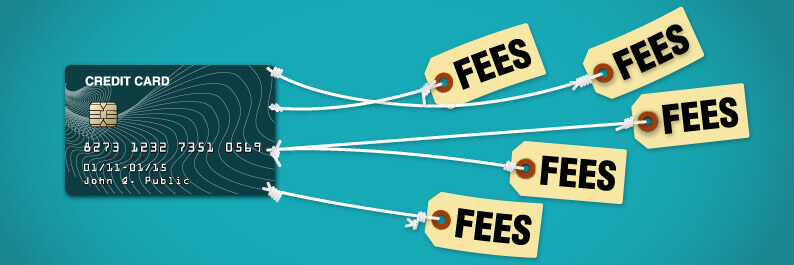Credit cards can be incredibly convenient for managing finances, building credit, and earning rewards. However, beneath the surface, they often carry hidden costs that can lead to financial pitfalls if overlooked. Understanding these costs and learning how to navigate them effectively is crucial for maintaining financial health.
This article explores the hidden costs of credit cards and offers actionable tips to avoid them.
1. Interest Charges: The Silent Money Drainer
The primary hidden cost of credit cards comes from interest rates, especially if you carry a balance.
- APR (Annual Percentage Rate): Most credit cards charge interest on unpaid balances. This rate can range from 15% to over 25%, compounding your debt.
- Deferred Interest: Some promotional offers may delay interest charges, but if you don’t pay the balance in full by the deadline, all accrued interest is added retroactively.
How to Avoid:
- Pay your balance in full each month to avoid interest charges.
- Look for credit cards with a low or 0% introductory APR if you need to carry a balance temporarily.
2. Annual Fees: Paying for Perks You May Not Use
Many credit cards charge annual fees in exchange for rewards or benefits, but these costs can outweigh the perks.
- High-end cards often charge $95 to $500 annually.
- If you don’t maximize the rewards, the fee becomes an unnecessary expense.
How to Avoid:
- Choose no-annual-fee cards if you don’t need premium perks.
- Compare the value of rewards to the annual fee before committing.
3. Foreign Transaction Fees
When traveling abroad or shopping on international websites, credit card companies may charge a foreign transaction fee, typically around 3% of the purchase amount.
How to Avoid:
- Opt for a card with no foreign transaction fees, such as the Chase Sapphire Preferred or Capital One Venture Rewards.
4. Late Payment Fees
Missing a payment deadline can result in late fees, which usually range from $25 to $40. These charges can quickly add up, especially if you miss multiple payments.
How to Avoid:
- Set up automatic payments to ensure you never miss a due date.
- Use reminders or calendar alerts for manual payments.
5. Balance Transfer Fees
Transferring a balance from one card to another with a lower interest rate can save money, but it often comes with a balance transfer fee of 3-5% of the transferred amount.
How to Avoid:
- Look for cards offering no balance transfer fees during promotional periods.
- Calculate whether the savings from a lower interest rate outweigh the transfer fee.
6. Cash Advance Fees
Withdrawing cash using a credit card incurs a cash advance fee, typically 3-5% of the amount, along with a higher interest rate than regular purchases.
How to Avoid:
- Use a debit card or savings account for cash withdrawals.
- Avoid using credit cards for cash advances unless it’s an emergency.
7. Reward Redemption Fees
Some credit cards impose fees for redeeming rewards or transferring points to travel partners. This reduces the value of the rewards earned.
How to Avoid:
- Read the fine print on reward redemption policies.
- Choose cards that offer flexible and free redemption options.
8. Over-Limit Fees
Although less common due to regulatory changes, some cards may charge an over-limit fee if you exceed your credit limit.
How to Avoid:
- Monitor your spending closely through mobile apps or online banking.
- Request a credit limit increase if you consistently approach your limit.
9. Hidden Costs of Rewards Programs
Rewards cards may encourage overspending to earn points, which can lead to higher balances and interest charges.
How to Avoid:
- Focus on earning rewards through regular spending, not unnecessary purchases.
- Redeem points strategically to maximize their value.
10. Inactivity Fees
Some issuers charge fees if your card remains inactive for an extended period, effectively penalizing you for not using it.
How to Avoid:
- Make small purchases periodically to keep your card active.
- Choose cards that don’t have inactivity fees.
11. Hidden Terms in Promotional Offers
Promotional offers like 0% APR or sign-up bonuses often have strict conditions that, if unmet, result in additional charges.
How to Avoid:
- Read the terms and conditions carefully.
- Ensure you meet the requirements, such as spending thresholds, within the specified timeframe.
Conclusion
Credit cards are powerful financial tools, but hidden costs can quickly erode their benefits if you’re not vigilant. By understanding these potential pitfalls and adopting proactive strategies, you can avoid unnecessary fees and make the most of your credit card’s features.
Managing credit responsibly requires discipline, regular monitoring, and an informed approach. Take control of your finances and let your credit cards work for you—not against you.
FAQs
Q: How can I avoid paying interest on my credit card?
A: Pay your balance in full each billing cycle. If you must carry a balance, opt for a card with a low or 0% APR.
Q: Are there any credit cards without hidden fees?
A: Yes, many cards are transparent about their fees. Look for no-annual-fee options and carefully review the terms and conditions.
Q: Do credit cards always charge foreign transaction fees?
A: No, some cards, like the Capital One Venture Rewards, do not charge foreign transaction fees.
Q: What should I do if I miss a credit card payment?
A: Pay as soon as possible to minimize late fees and interest charges. Contact your issuer to request a waiver if it’s your first missed payment.
Q: Is it worth paying an annual fee for a rewards card?
A: It depends on your spending habits. If the rewards outweigh the fee, it can be worthwhile. Otherwise, consider no-annual-fee alternatives.
Avoid the pitfalls of credit cards by staying informed and making financial decisions that align with your goals.


